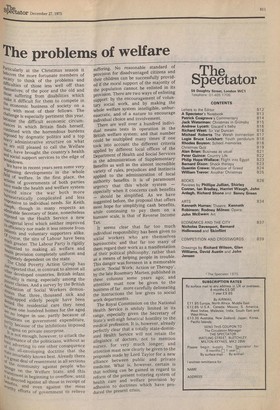The problems of welfare
Particularly at the Christmas season it behoves the more fortunate members of letY to think of the problems and iculties of those less well off than themselves; of the poor and the old and those suffering from disabilities which faake it difficult for them to compete in !the economic business of society on a evel with most of their fellows. The allerige is especially pertinent this year, „ cause the difficult economic circum"anoes in which Britain finds herself, CoMbined with the horrendous burdens 11:11Posed by dogmatic politics and a top ,eavY administrative structure on what swe are still pleased to call the Welfare ntate, have brought the country's health reakdown 11:1 social support services to the edge of u ri We have in recent years seen some very "epressing developments in the whole \aeld of welfare. In the first place, the h-caticlos of governments of both parties N.:ye roade the health and welfare system t-eated since the war both more rureaucratically complicated and less Jesponsive to individual needs. Sir Keith a,c)sePh, though in many respects an ivroirable Secretary of State, nonetheless P°sed on the Health Service a new it,agerial level which neither improved e.fficiency nor made it less remote from oaftlents and voluntary supporters alike. 41 course, the sins of Labour havebeen c,-,11ch greater. The Labour Party is rigidly C lihnitted to making all welfare and toealth provision completely uniform and .,"11)tetely dependent on the state. je:ttle Child Poverty Action Group has otT reported that, in contrast to almost all rh"er developed countries, British infant 00-4talit1 is rising, especially among the AscIrer classes. And a survey by the British strst)ciation of Social Workers demonban4dtes that three, thousand sick and dehT41caPped elderly people have been bee the residential care they need areciuse one hundred homes for the aged longer in use, partly because of pa).7tions on government expenditure, dtlY because of the inhibitions imposed it groa on private enterprise. krt, Is not enough, however, to attack the le of of the politicians, without at of -itkadverting to one other consequence sf4i."1 all-enveloping doctrine that the lsa'e invariably knows best. Already there of t'eat deal of resentment in all sections spobhe Community against people who tes,-ge on the Welfare State, and this it i;",troent is beginning to overflow, until ben, u!rected against all those in receipt of tiro,1/4%efLIts, and even against the most ' efforts of government to relieve suffering. No reasonable standard of -provision for disadvantaged citizens and their children can be successfully provided if the moral support of the majority of the population cannot be enlisted in its provision. There are two ways of enlisting support: by the encouragement of voluntary social work, and by making the whole welfare system intelligible, unbureaucratic, and of a nature to encourage individual choice and involvement. There are well over a hundred individual means tests in operation in the British welfare system; and that number could be multiplied many times if one took into account the different criteria applied by different local offices of the Department of Health and Social Services in the administration of Supplementary Benefits as well as the almost incredible variety of rules, prejudices and instincts applied to the administration of local authority benefits. It is of paramount urgency that this whole system — especially when it concerns cash benefits — should be simplified. As we have suggested before, the proposal that offers most hope for simplifying cash benefits, while continuing to pay them on a humane scale, is that of Reverse Income Tax.
It seems clear that far too much individual responsibility has been given to social workers who are themselves bureaucrats; and that far too many of them regard their work as a manifestation of their political philosophy, rather than as a means of helping people in trouble. This danger was foreseen in a memorable article, 'Social Work; Action or Therapy', by the late Rosemary Marten, published in these columns some years ago; and attention must now be given to the business of far more carefully delineating the instructions the law gives to social work departments.
The Royal Commission on the National Health Service is unduly limited in its range, especially given the Secretary of State's well-nigh fanatical hostility to the medical profession. It is, however, already perfectly clear that a totally state-dominated Health Service will not retain the allegiance of doctors, not to mention nurses, for very much longer; and attention must now clearly be given to the proposals made by Lord Taylor for a new alliance between public and private medicine. What is, however, certain is that nothing can be gained in regard to reform of the present tottering system of health care and welfare provision by adhesion to doctrines which have produced the present crisis.


































 Previous page
Previous page